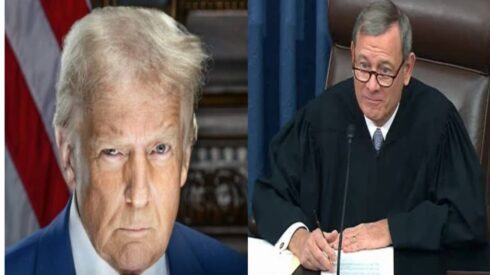Chief Justice John Roberts has issued a rare and forceful statement, rejecting President Donald Trump’s demands to impeach federal judges over unfavorable rulings. Addressing growing concerns over judicial independence, Roberts emphasized that for more than two centuries, the impeachment process has never been used as a tool to overturn legal decisions. He reminded the public that the appellate review process exists precisely to address disputes over judicial rulings.
John Roberts’ remarks come in direct response to Trump’s attacks on U.S. District Judge James E. Boasberg, who recently ruled against a Trump administration deportation policy. Trump called the judge a “Radical Left Lunatic” and urged Congress to remove him from the bench. Roberts’ intervention signals deep concern within the judiciary about rising political pressure on the courts.
Roberts Defends Judicial Independence Amid Political Turmoil
Chief Justice John Roberts underscored the importance of maintaining an independent judiciary, warning that political attacks on judges threaten the constitutional balance of power. In his statement, Roberts reaffirmed that federal judges are granted lifetime appointments to insulate them from political influence, ensuring that their rulings are based on the law rather than shifting political winds.
By taking a public stand, John Roberts is reinforcing the judiciary’s role as a check on executive and legislative power. His response also highlights growing fears that Trump’s rhetoric could set a dangerous precedent, encouraging future leaders to view judicial impeachment as a tool for political revenge rather than a mechanism to address judicial misconduct.
Roberts’ Statement Sparks Legal Community Backlash Against Trump
Chief Justice John Roberts’ strong words have been met with widespread support from legal scholars and constitutional experts, who warn that Trump’s impeachment threats could erode public trust in the courts. The American Bar Association and other legal organizations have issued statements echoing Roberts’ concerns, emphasizing that judicial decisions must be challenged through legal appeals, not political intimidation.
Trump’s critics argue that his continued attacks on the judiciary reflect an attempt to reshape the courts to align with his political agenda. Roberts’ intervention highlights the urgency of defending judicial independence.
Roberts’ Rare Public Rebuke Signals a Judicial Turning Point
Chief Justice John Roberts’ public statement is unusual, as he typically avoids direct political commentary. His decision to openly challenge Trump’s rhetoric suggests that the judiciary views the former president’s impeachment demands as a significant threat to judicial stability.
Legal analysts see John Roberts’ remarks as a defining moment in the ongoing battle over the rule of law in America. By stepping into the political fray, Roberts is sending a clear message that the judiciary will not be intimidated, reaffirming its commitment to impartiality and constitutional principles.
Judicial Impeachment as a Last Resort
Chief JusticeJohn Roberts’ statement also serves as a historical reminder that judicial impeachment is an extreme measure reserved for serious ethical breaches, not disagreements over legal interpretations. Since the nation’s founding, only eight federal judges have been removed through impeachment, all for misconduct rather than their rulings.
Roberts’ insistence that judicial decisions should be reviewed through appellate courts rather than political retaliation reinforces the legal system’s structure. His remarks stand as a constitutional warning against the misuse of impeachment, safeguarding the judiciary’s role as a nonpartisan institution.
Roberts’ Stand Strengthens Judiciary’s Role in 2025 Political Landscape
Chief Justice Roberts’ intervention could have lasting implications as Trump continues his campaign for a second term. With multiple legal cases pending against him, the president’s attacks on the courts are likely to escalate. Roberts’ statement serves as a preemptive defense against further efforts to politicize the judiciary.
As Trump’s influence over the Republican Party remains strong, Roberts’ rebuke marks a significant moment in the judicial branch’s resistance to political interference. His firm stance reinforces the courts’ independence, ensuring that legal rulings are based on constitutional principles rather than political pressures.














